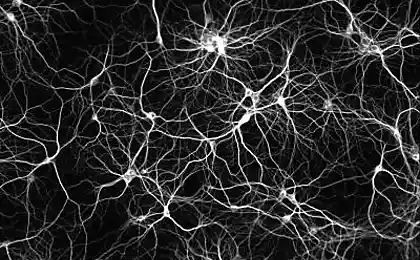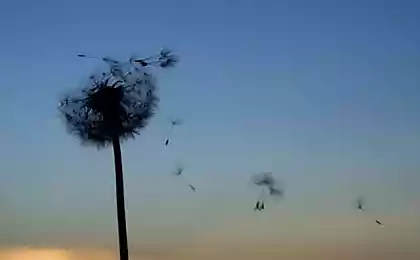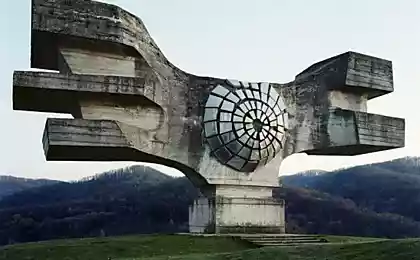1130
We remember
This memorial is the burial place of the remains of more than 600 Red Army soldiers who died during the breakthrough line of defense "Wotan».
The complex is located in the village of Chapayevka, Tokmak district, Zaporizhia region.
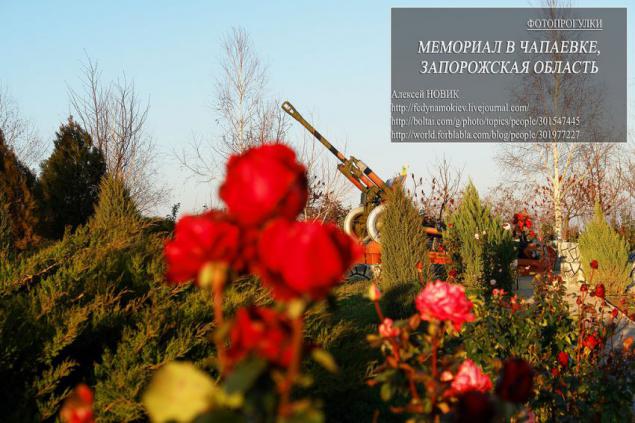
Here is a short historical summary:
In the fall of 1943, our troops frantically rushed to the West to liberate the capital of Kiev, Ukrainian SSR. But the Germans stubbornly defended this direction - from the coast of the Azov Sea to the Dnieper River of the Wehrmacht created a powerful defensive line, "Wotan", named for the ancient Germanic god of war. Defensive line was a few rows of fortifications and a complete profile throughout its length full of pillboxes, machine-gun nests c extensive minefields and reinforced armored units. Fighting in these places were brutal and bloody. Killed on the one and the other side was a lot. According to the statistics of military casualties among our soldiers only at the site of hostilities were about 500 people killed per day. And when you consider that taking Prishibskih heights lasted 30 days .... That such simple arithmetic and terrible war. Now the search for graves and devotion to the land of dead engaged enthusiasts - military search parties.
Historical memorial complex, which opened in October 29, 2005 in the village of Chapayevka Tokmak district of Zaporozhye region, has no analogues in Ukraine - on it with full military honors and according to Christian tradition for several years in a row perezahoronyayutsya remains of the liberators of our land from the German -fashistskih invaders killed in the assault line "Wotan" in October 1943. Kopmpleks - the result of long-term job search engine expeditions Association search teams Zaporozhye region in the framework of the project "Unfinished War»
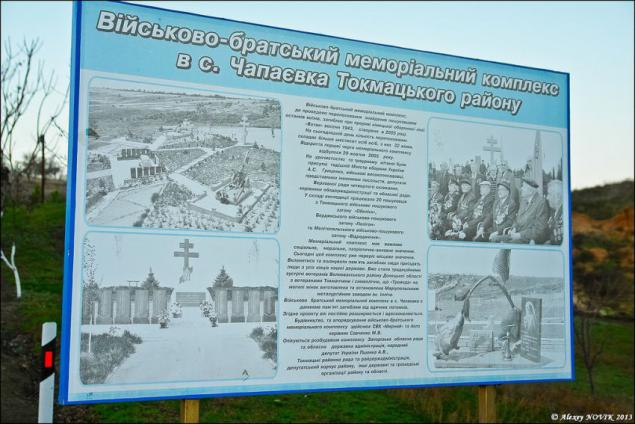
Eternal memory to the fallen!
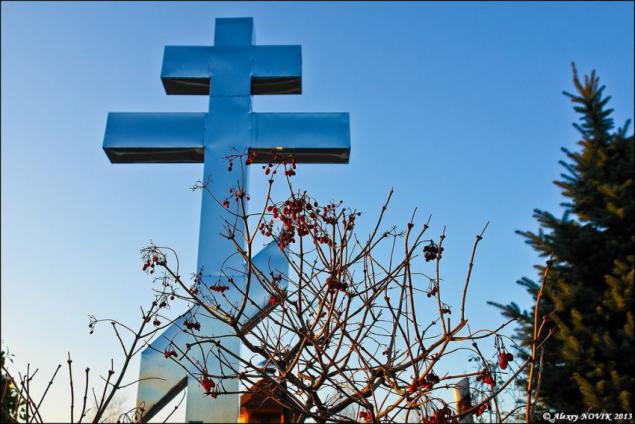
Artillery, the god of war. legendary ZIS-3
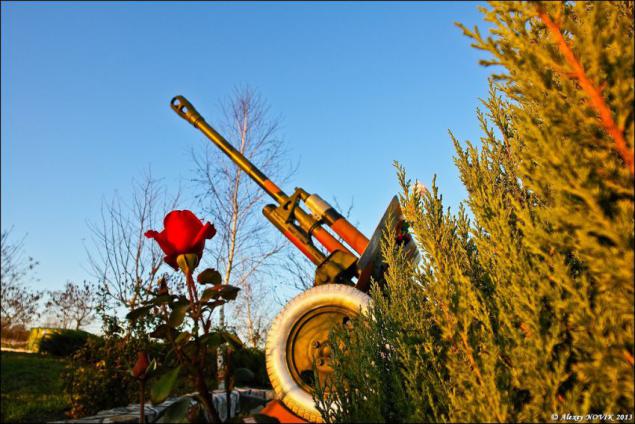
A formidable weapon against the backdrop of peaceful sky
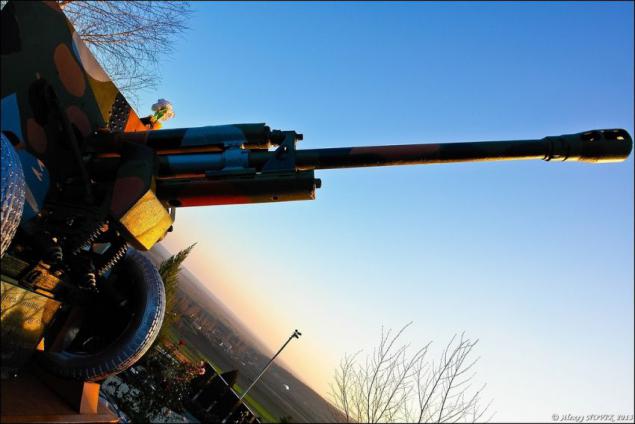
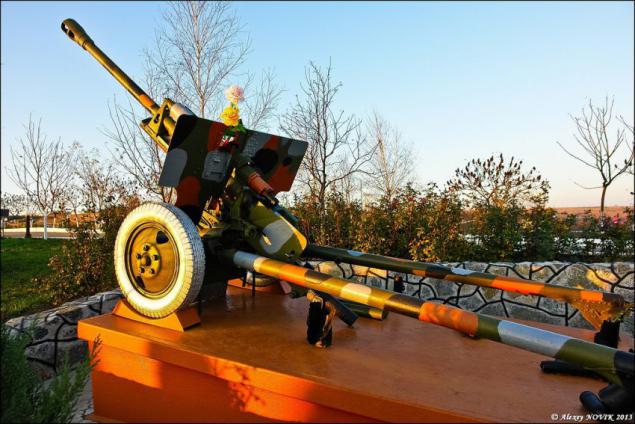
These slopes Soviet troops stormed
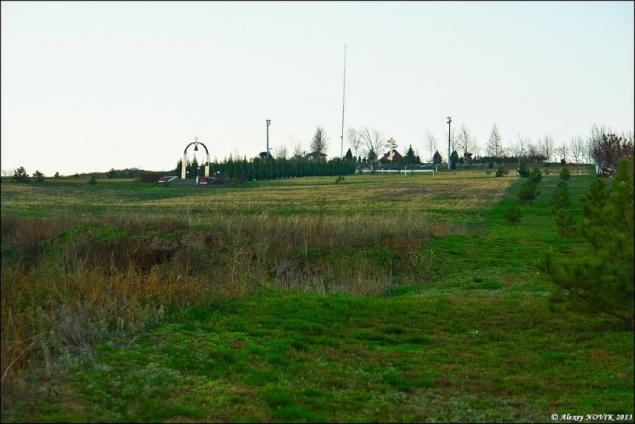
The area exposed to fire for many kilometers. Our soldiers were going to die
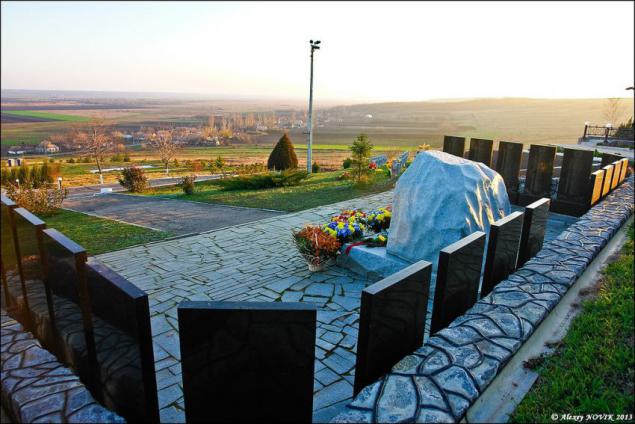
At the top of their waiting for the German machine-gun nests
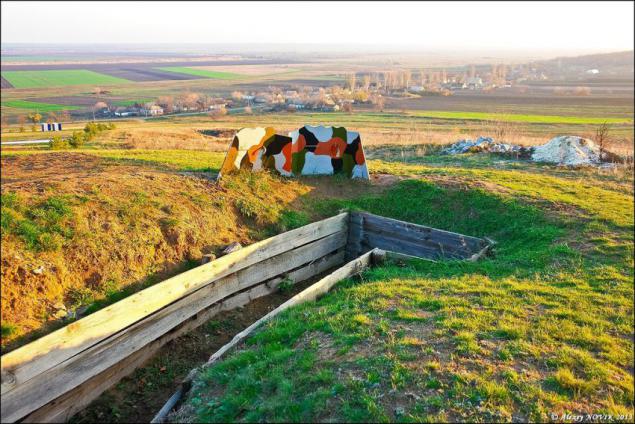
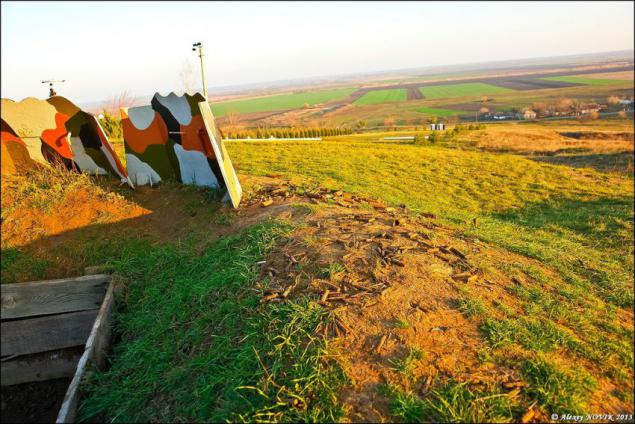
Land near the German gun emplacements, literally strewn with sleeves
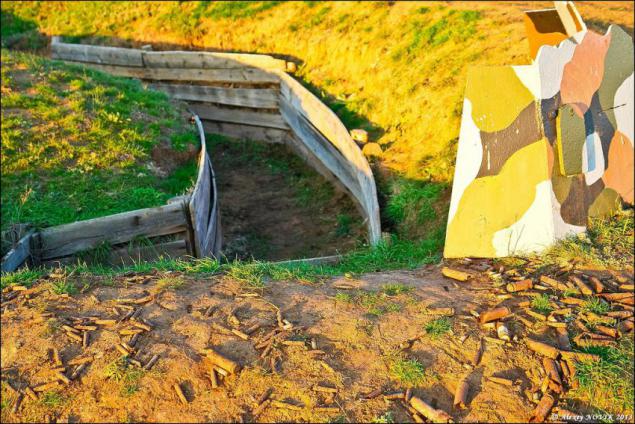
These rusty pieces of metal when it brought death
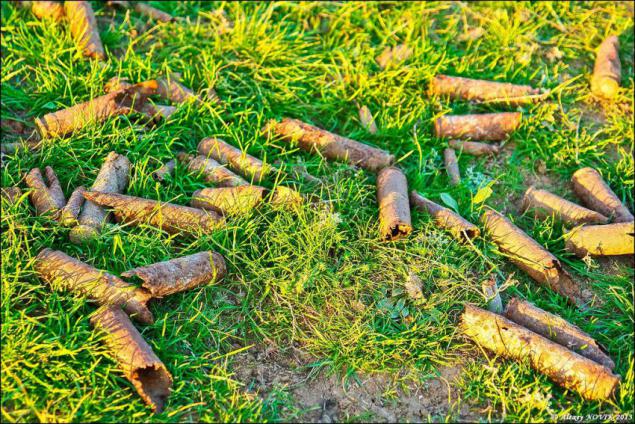
Flies, flies through the sky wedge tired
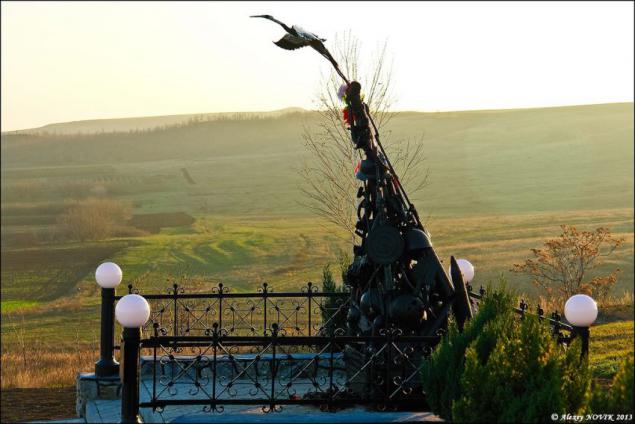
It seems to me sometimes that soldiers,
Since no blood came fields
not in our land perished once
And turned into white cranes
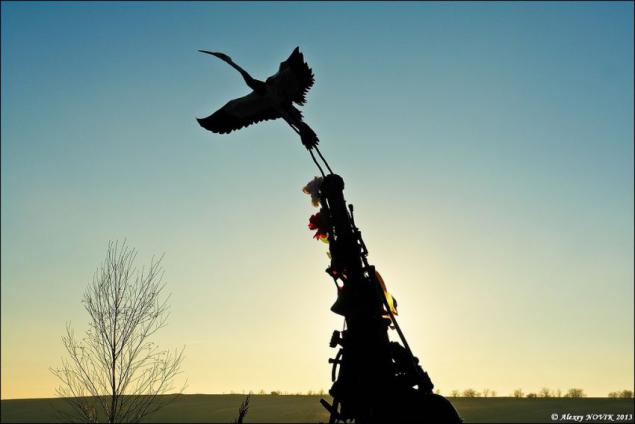
The monument is made entirely from the remnants of weapons, cartridges and shells found by searchers
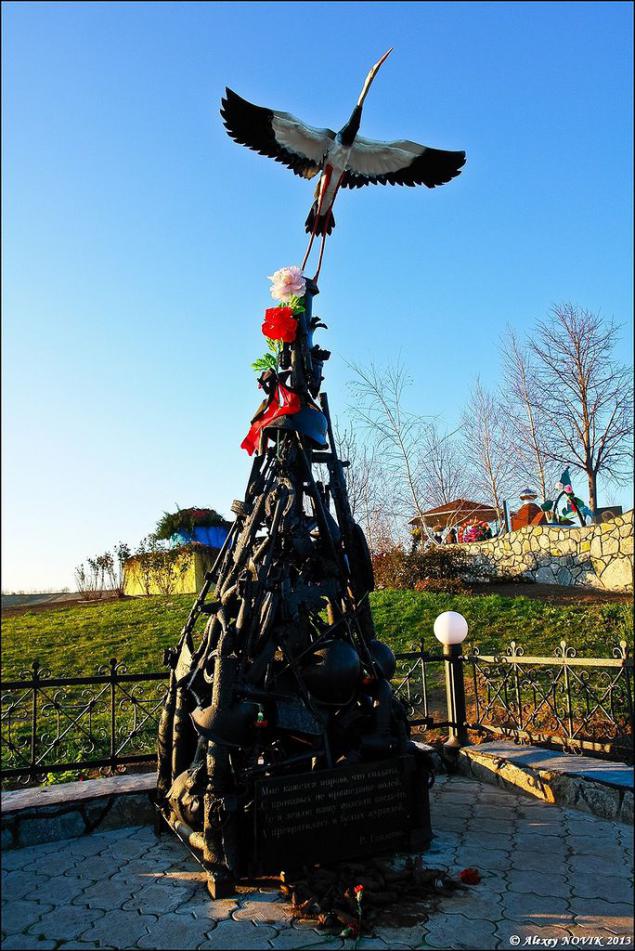
In one monument merged helmets snaryady.gilzy and saperskie blades, guns and grenades weapons
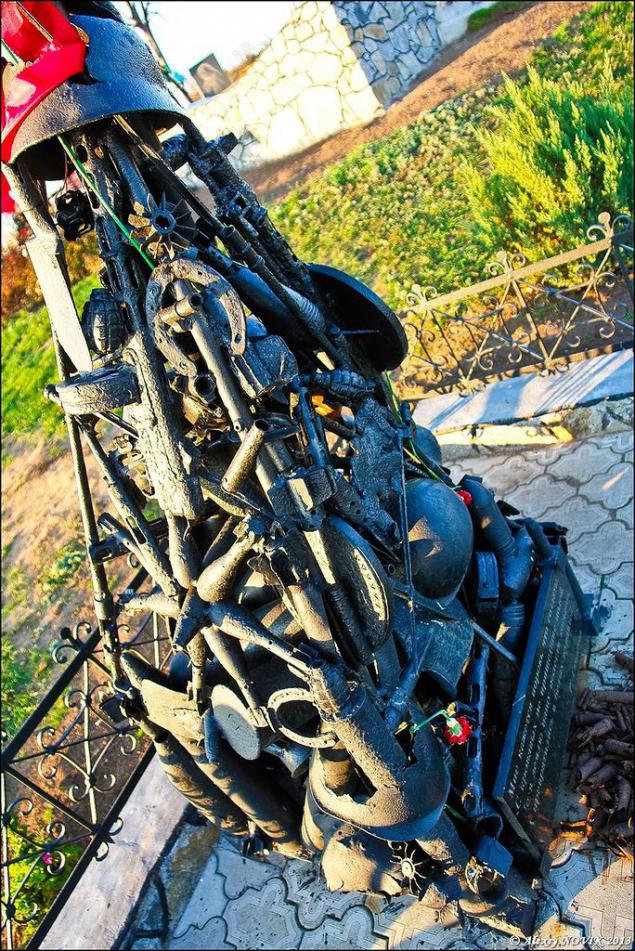
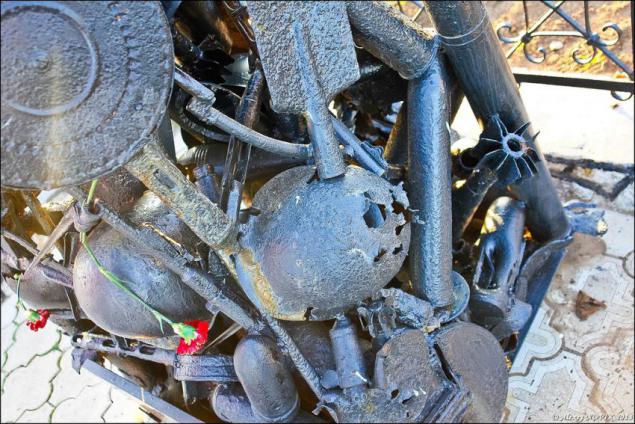
And dozens of rusty shell casings at the bottom, instead of colors
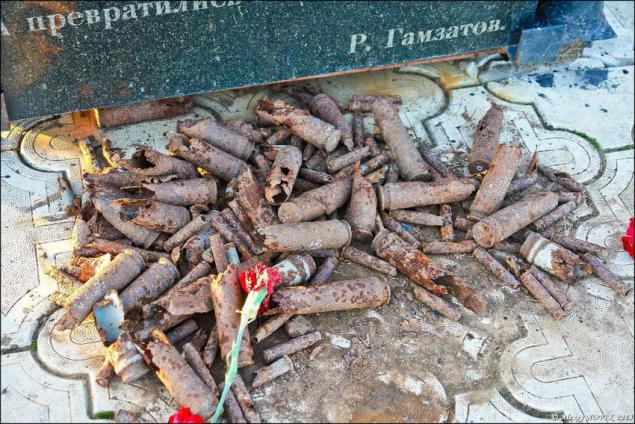
Stella with a thousand names of fallen soldiers
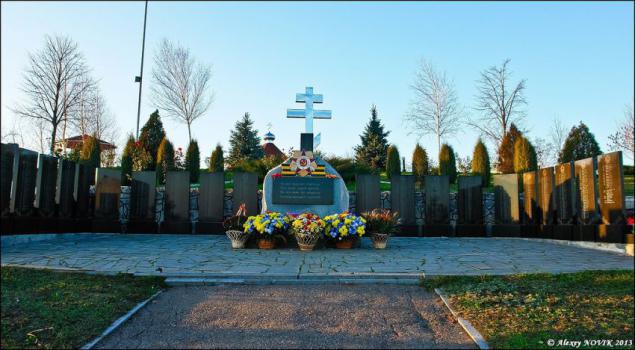
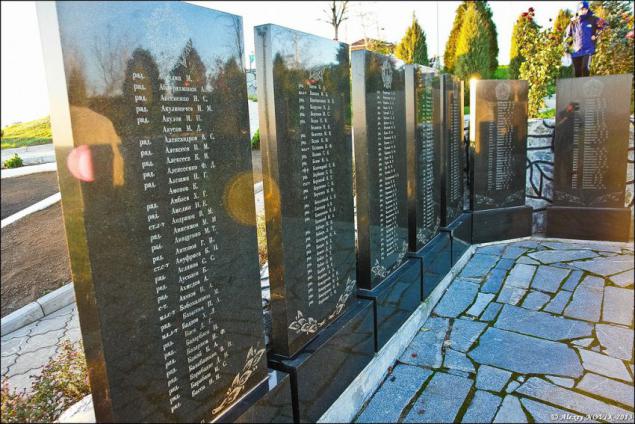
And dozens of granite cross on the burial place of the remains
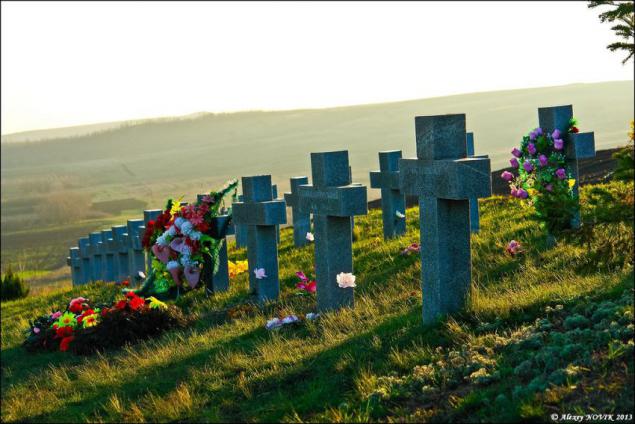
Under these crosses are hundreds of nameless soldiers
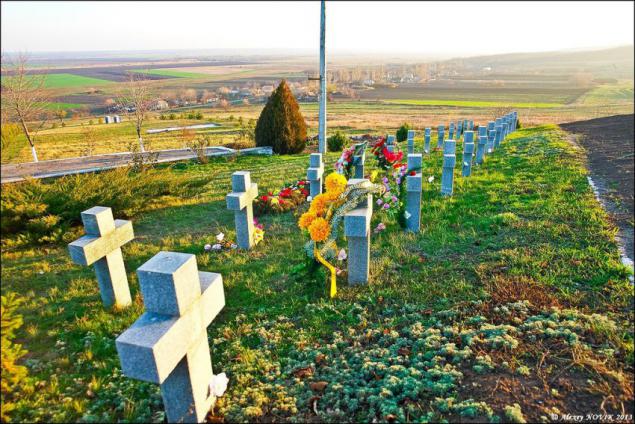
And only a handful of crosses with the names of
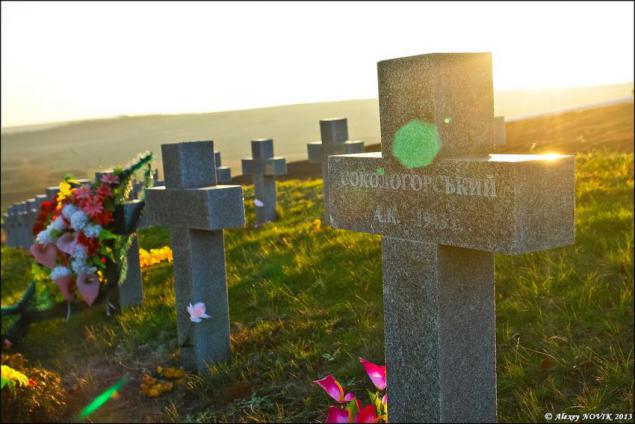
These crosses relatives come from all over the Union
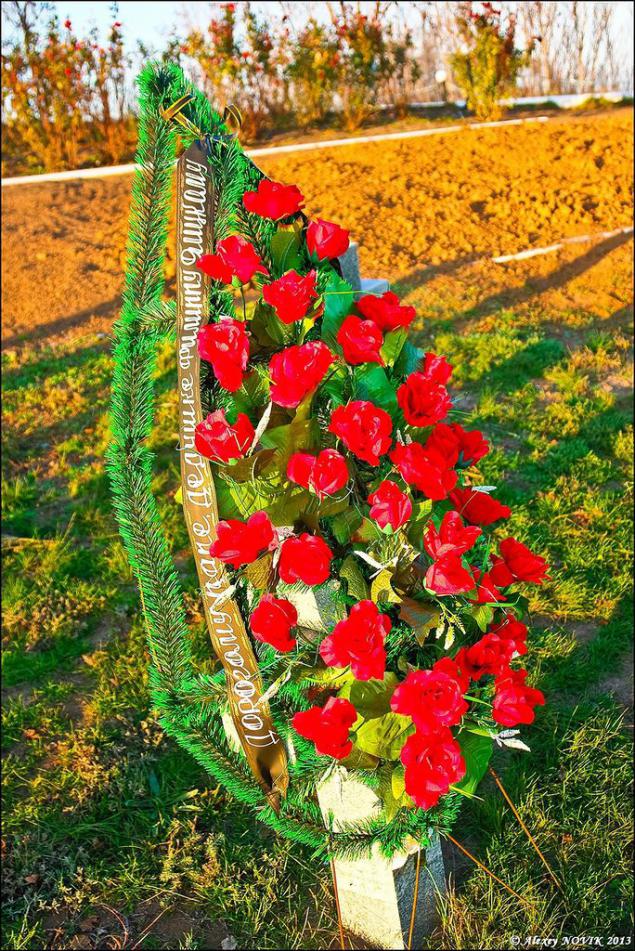
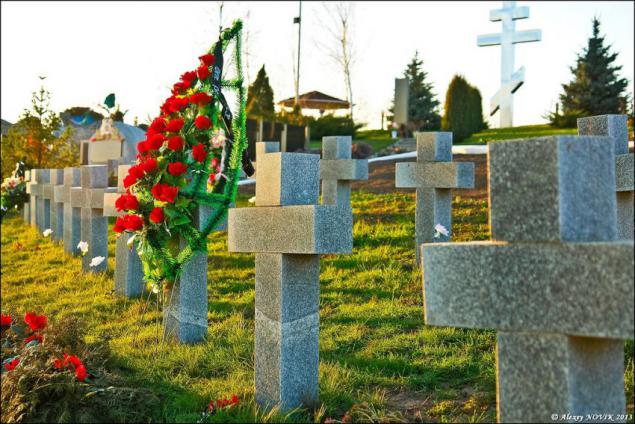
Monument female penal battalion
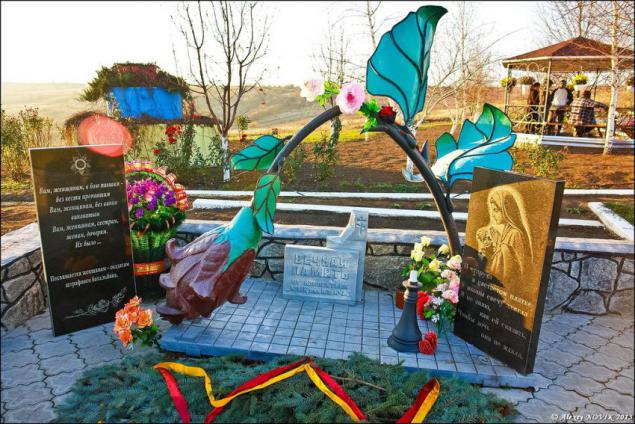
The remains of them still have not found
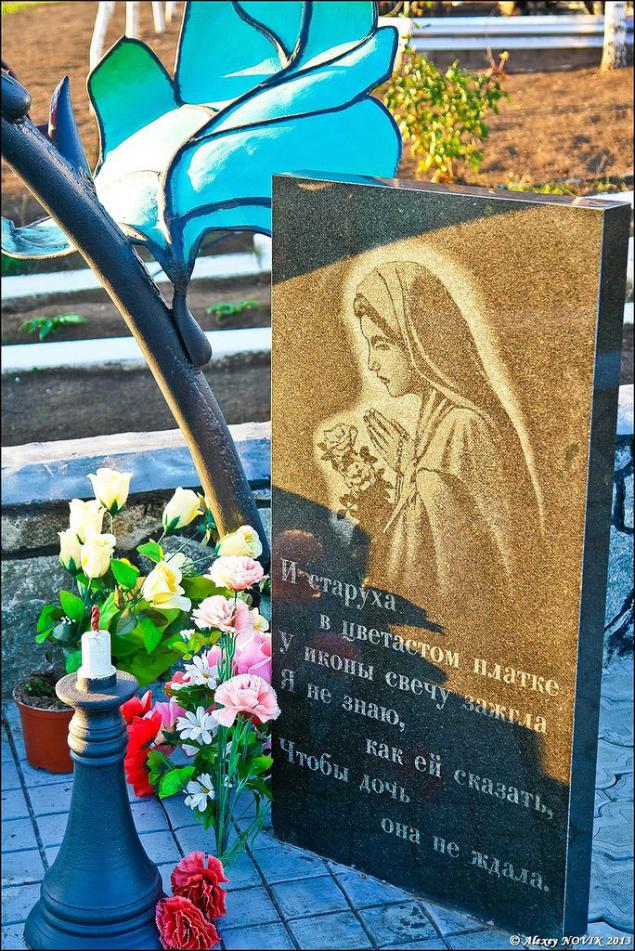
Crowned by a small chapel memorial
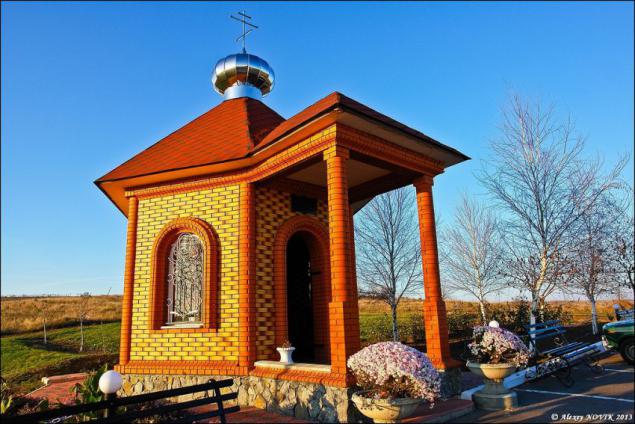
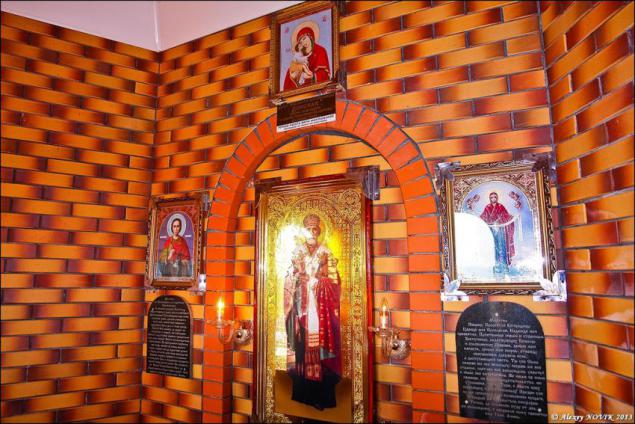
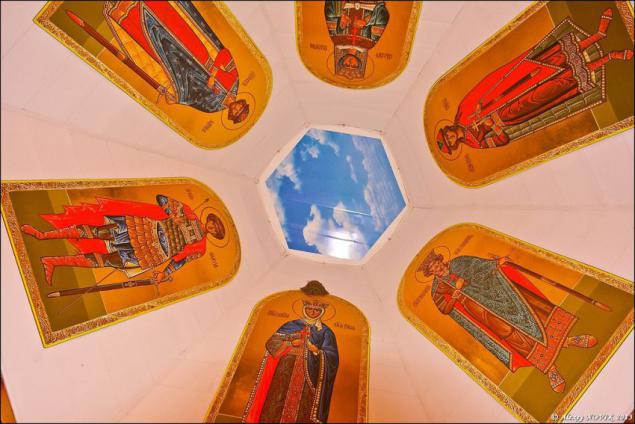
Swallows build their nests inside
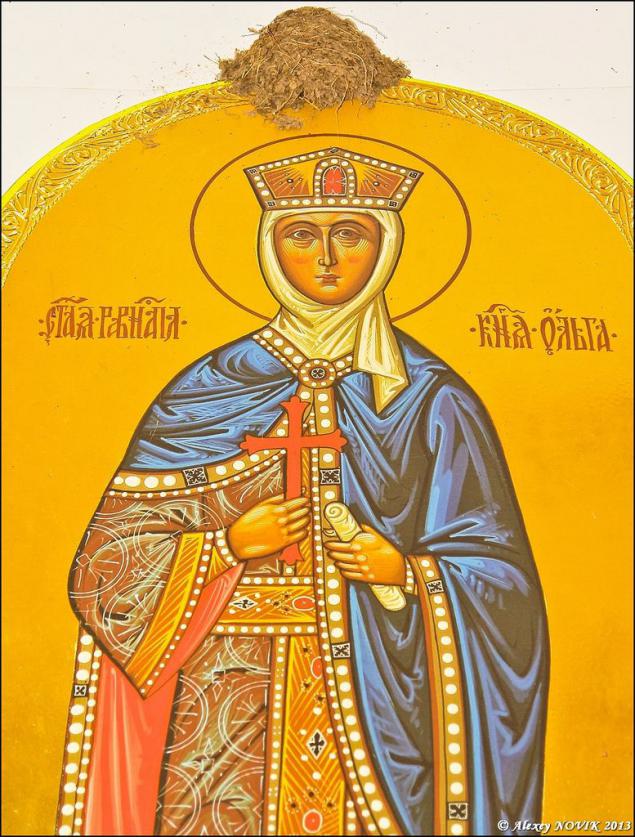
There is always a lot of fresh flowers

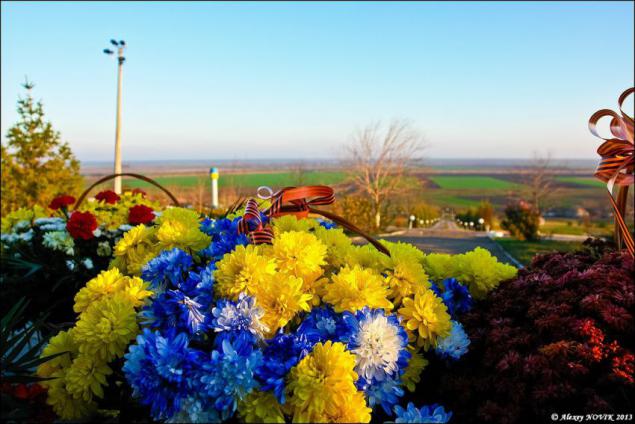

Lonely rose at sunset
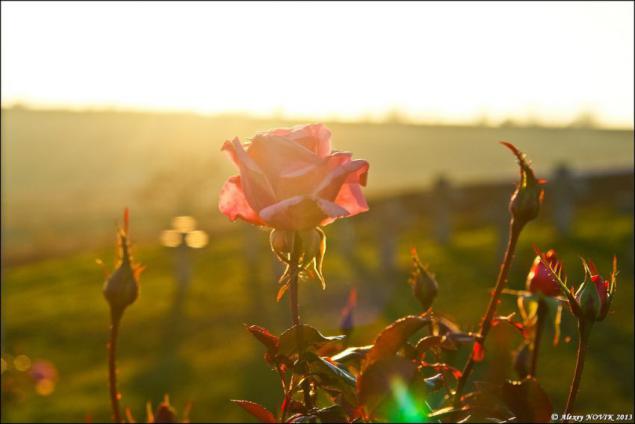
War and Peace
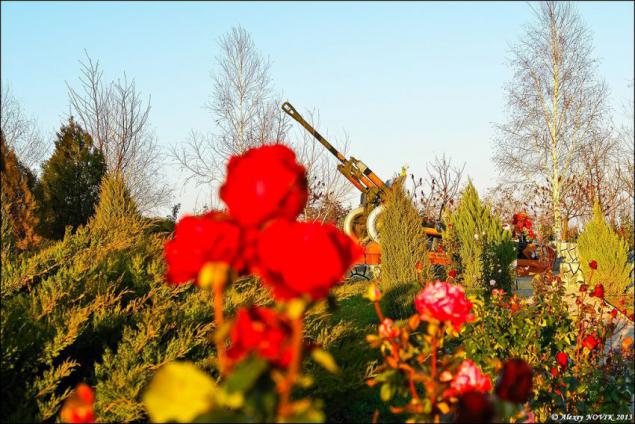
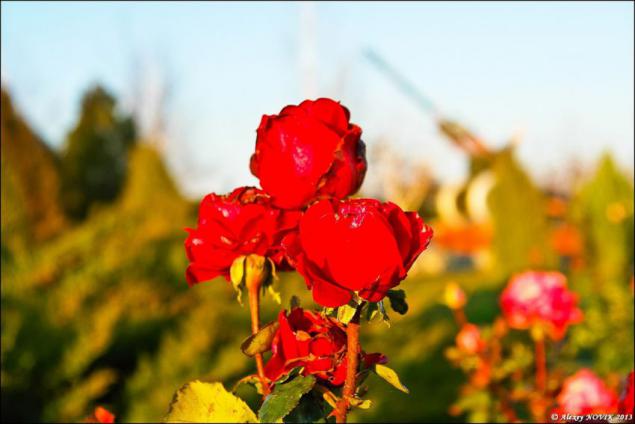
Well, a bit of historical material for the curious
The defeat of Nazi troops at Stalingrad abruptly changed the course of the Second World War and laid the foundation for their expulsion from the territory of the Soviet Union, the liberation of Ukraine. After another defeat in the territory of Donbas Hitler's troops retreated to a new line of defense from the Sea of Azov, along the right bank of the Dnieper River Dairy to smoothly part of the so-called "East shaft».
Great hopes are pinned on the Nazis created a line here, "Wotan" - well thought-out military fortifications. It begins near Vasilevka-Tokmak-Molochansk, the so-called "Molochansk Heights" ("prishibskie", "Chapaevskie"). Then it goes down to the south for 150 kilometers, including the Dairy estuary, resting on the Azov Sea. Hold Melitopol, who was "the gateway to the Crimea" and the only overland artery between the Crimean group and the southern group of forces of the German army - such task put in front of the troops German command. About how important it gave the fascist command lines, indicates the arrival in Zaporozhye Hitler, who personally acquainted with the plans of its strategists and military engineers.
German defenses on the river. Dairy on the western shore of the high consisted of continuous anti-tank ditch, rolling seats in the scarps. There were more fortified by Soviet tanks areas, for example, in the area with. Konstantinovka was built three anti-tank ditch. For antitank ditches system was field-type structures: trenches, machine-gun platforms, firing positions for mortars and anti-tank guns, bunkers, bunkers and armored covers ...
The terrain, the right bank (up to 80 m) p. Dairy, favored the Germans, as a natural barrier and allowing the observation to a considerable depth of the Soviet troops. Since March 1943 the Nazis began to prepare a defensive line depth of 12-18 kilometers. During the spring and summer for the construction of military fortifications were driven local residents and Red Army prisoners of war Melitopol prison. In Melitopol district were transferred from Berlin sapper-engineer units.
In September 1943, the advancing Soviet troops of the 2nd Guards Army and the 3rd Division stormed Volnovakha Molochansk, but further breakthrough line of defense "Wotan" stalled.
The Germans dug in to Prishibskih altitudes, covered with steep, winding river. As a result of fierce fighting, the German defense was broken, and about 10 thousand German soldiers forever left lying in the steppes of Ukraine. Huge losses (about 3 thousand dead day) carry our poorly armed troops. Bury the dead in their graves, trenches and helped civilians. Tokmok administration together with groups of searchers resurrected the story of the assault Chapaevskie height in the village of Chapayevka, in which women took part in a penal battalion composed of 312 people. During the night extension to the front battalion mistakenly hit the Germans in the rear. They were all taken prisoner and shot one of the high-rises.
The idea of the reburial of Soviet soldiers and create a unique memorial was born in the early 2000s. It was originally planned to install on the hill near the Chapaevka huge cross, granite rocks and pillars of granite tombstones as at Arlington Cemetery ... The project is implemented Cossacks - the artist and the poet Vladimir Forostetsky Gregory Fierce. There was a memorial complex in Chapayevka thanks to the chairman of the local agricultural production cooperative "Peaceful" Nikolai Savchenko. Monument to soldiers of the female penal battalion who died during the Great Patriotic War on the territory of Zaporizhzhya region, workers manufactured the chemical and metallurgical factory metallurgical combine them. Illich (Mariupol).
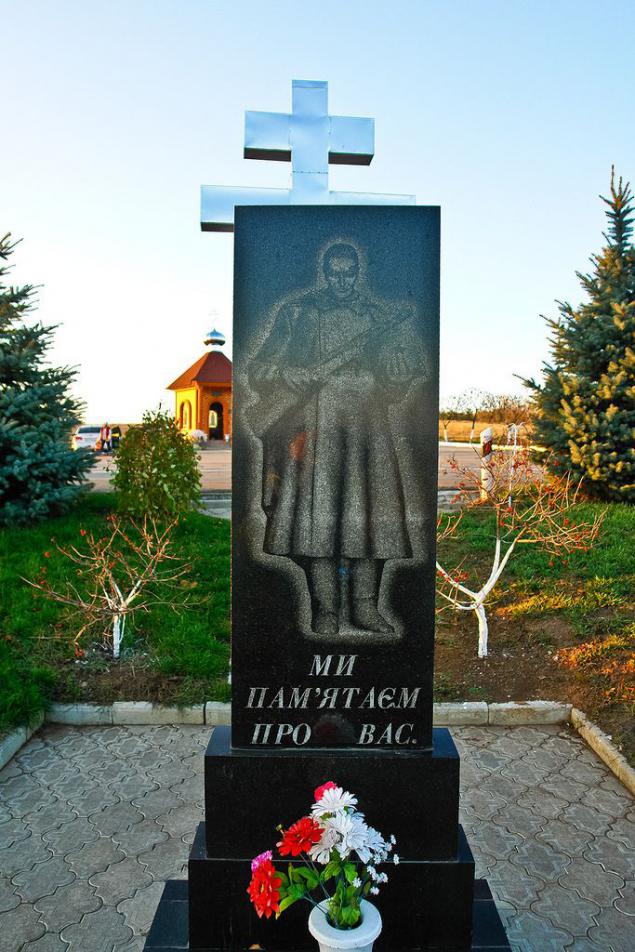
Now the search operation in the area Chapaevka lead squads "Polygon" (Berdyansk), "Obelisk" (Tokmak), "Revival" (Melitopol), "Boundary" (nuts).
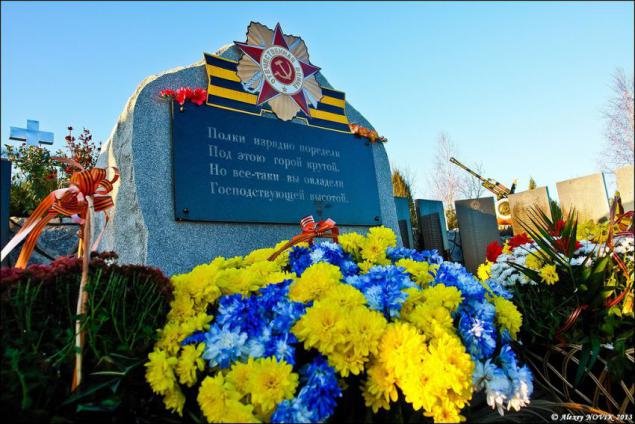
Eternal memory!
--img40--
Source: fcdynamokiev.livejournal.com
The complex is located in the village of Chapayevka, Tokmak district, Zaporizhia region.

Here is a short historical summary:
In the fall of 1943, our troops frantically rushed to the West to liberate the capital of Kiev, Ukrainian SSR. But the Germans stubbornly defended this direction - from the coast of the Azov Sea to the Dnieper River of the Wehrmacht created a powerful defensive line, "Wotan", named for the ancient Germanic god of war. Defensive line was a few rows of fortifications and a complete profile throughout its length full of pillboxes, machine-gun nests c extensive minefields and reinforced armored units. Fighting in these places were brutal and bloody. Killed on the one and the other side was a lot. According to the statistics of military casualties among our soldiers only at the site of hostilities were about 500 people killed per day. And when you consider that taking Prishibskih heights lasted 30 days .... That such simple arithmetic and terrible war. Now the search for graves and devotion to the land of dead engaged enthusiasts - military search parties.
Historical memorial complex, which opened in October 29, 2005 in the village of Chapayevka Tokmak district of Zaporozhye region, has no analogues in Ukraine - on it with full military honors and according to Christian tradition for several years in a row perezahoronyayutsya remains of the liberators of our land from the German -fashistskih invaders killed in the assault line "Wotan" in October 1943. Kopmpleks - the result of long-term job search engine expeditions Association search teams Zaporozhye region in the framework of the project "Unfinished War»

Eternal memory to the fallen!

Artillery, the god of war. legendary ZIS-3

A formidable weapon against the backdrop of peaceful sky


These slopes Soviet troops stormed

The area exposed to fire for many kilometers. Our soldiers were going to die

At the top of their waiting for the German machine-gun nests


Land near the German gun emplacements, literally strewn with sleeves

These rusty pieces of metal when it brought death

Flies, flies through the sky wedge tired

It seems to me sometimes that soldiers,
Since no blood came fields
not in our land perished once
And turned into white cranes

The monument is made entirely from the remnants of weapons, cartridges and shells found by searchers

In one monument merged helmets snaryady.gilzy and saperskie blades, guns and grenades weapons


And dozens of rusty shell casings at the bottom, instead of colors

Stella with a thousand names of fallen soldiers


And dozens of granite cross on the burial place of the remains

Under these crosses are hundreds of nameless soldiers

And only a handful of crosses with the names of

These crosses relatives come from all over the Union


Monument female penal battalion

The remains of them still have not found

Crowned by a small chapel memorial



Swallows build their nests inside

There is always a lot of fresh flowers



Lonely rose at sunset

War and Peace


Well, a bit of historical material for the curious
The defeat of Nazi troops at Stalingrad abruptly changed the course of the Second World War and laid the foundation for their expulsion from the territory of the Soviet Union, the liberation of Ukraine. After another defeat in the territory of Donbas Hitler's troops retreated to a new line of defense from the Sea of Azov, along the right bank of the Dnieper River Dairy to smoothly part of the so-called "East shaft».
Great hopes are pinned on the Nazis created a line here, "Wotan" - well thought-out military fortifications. It begins near Vasilevka-Tokmak-Molochansk, the so-called "Molochansk Heights" ("prishibskie", "Chapaevskie"). Then it goes down to the south for 150 kilometers, including the Dairy estuary, resting on the Azov Sea. Hold Melitopol, who was "the gateway to the Crimea" and the only overland artery between the Crimean group and the southern group of forces of the German army - such task put in front of the troops German command. About how important it gave the fascist command lines, indicates the arrival in Zaporozhye Hitler, who personally acquainted with the plans of its strategists and military engineers.
German defenses on the river. Dairy on the western shore of the high consisted of continuous anti-tank ditch, rolling seats in the scarps. There were more fortified by Soviet tanks areas, for example, in the area with. Konstantinovka was built three anti-tank ditch. For antitank ditches system was field-type structures: trenches, machine-gun platforms, firing positions for mortars and anti-tank guns, bunkers, bunkers and armored covers ...
The terrain, the right bank (up to 80 m) p. Dairy, favored the Germans, as a natural barrier and allowing the observation to a considerable depth of the Soviet troops. Since March 1943 the Nazis began to prepare a defensive line depth of 12-18 kilometers. During the spring and summer for the construction of military fortifications were driven local residents and Red Army prisoners of war Melitopol prison. In Melitopol district were transferred from Berlin sapper-engineer units.
In September 1943, the advancing Soviet troops of the 2nd Guards Army and the 3rd Division stormed Volnovakha Molochansk, but further breakthrough line of defense "Wotan" stalled.
The Germans dug in to Prishibskih altitudes, covered with steep, winding river. As a result of fierce fighting, the German defense was broken, and about 10 thousand German soldiers forever left lying in the steppes of Ukraine. Huge losses (about 3 thousand dead day) carry our poorly armed troops. Bury the dead in their graves, trenches and helped civilians. Tokmok administration together with groups of searchers resurrected the story of the assault Chapaevskie height in the village of Chapayevka, in which women took part in a penal battalion composed of 312 people. During the night extension to the front battalion mistakenly hit the Germans in the rear. They were all taken prisoner and shot one of the high-rises.
The idea of the reburial of Soviet soldiers and create a unique memorial was born in the early 2000s. It was originally planned to install on the hill near the Chapaevka huge cross, granite rocks and pillars of granite tombstones as at Arlington Cemetery ... The project is implemented Cossacks - the artist and the poet Vladimir Forostetsky Gregory Fierce. There was a memorial complex in Chapayevka thanks to the chairman of the local agricultural production cooperative "Peaceful" Nikolai Savchenko. Monument to soldiers of the female penal battalion who died during the Great Patriotic War on the territory of Zaporizhzhya region, workers manufactured the chemical and metallurgical factory metallurgical combine them. Illich (Mariupol).

Now the search operation in the area Chapaevka lead squads "Polygon" (Berdyansk), "Obelisk" (Tokmak), "Revival" (Melitopol), "Boundary" (nuts).

Eternal memory!
--img40--
Source: fcdynamokiev.livejournal.com










